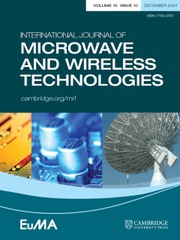The 24th European Microwave Week is an edition like no other. Affected by the COVID-19 pandemic, its dates were rescheduled twice and settled to 2nd–7th April 2022! The team, under the leadership of Prof Nick Ridler and with the support of European Microwave Association, braved the odds and organized the very first major in-person international event for the microwave community. The Week has full technical program for the 51st European Microwave Conference, the 16th European Microwave Integrated Circuit Conference, and the 18th European Radar Conference. These were complemented by 21 workshops and 9 short courses, covering the most significant and emerging topics in microwave engineering, and by the industrial exhibition with over 150 exhibitors. The Week was further enriched by 10 keynote lectures, 21 invited industrial talks, the Tom Brazil Doctoral School of Microwaves, and three fora: The Defense, Security and Space Forum; The Automotive Forum; and the 5G & Beyond Forum, which all were very well attended.
This Special Issue of the International Journal of Microwave and Wireless Technology (IJMWT) gathers most of the best technical contributions from the 2021 European Microwave Week (EuMW). The authors of the top-rated conference contributions have been invited to submit an extended manuscript to the IJMWT journal. All manuscripts received went through an additional review and editorial process. Fourteen finally accepted papers have formed this Special Issue. These papers reflect the most relevant topics and recent challenges in the area of microwave passive and active devices, metamaterials, EM theory, integrated circuits and modules, antenna systems, microwave and sub-terahertz systems, and radars.
As guest editors of this EuMW 2021 Special Issue, we would like to warmly thank all authors for their high-quality contributions. Of course, this Special Issue would not have been possible without the involved reviewers, whom we recognize and sincerely thank for their effort, wise advice, exhaustive criticism, and time dedication during the very challenging period. Furthermore, we sincerely acknowledge the Editor in Chief Professor Francisco Medina for his constant support and guidance during the review and editing process. Last but not least, we would like to thank the entire EuMW 2021 organizing team for their extraordinary work to shape and deliver this special European Microwave Week.
To conclude, we would like to wish you a pleasant reading of this Special Issue and invite you to submit your research results in the International Journal of Microwave and Wireless Technologies!

Yi Wang received the B.Sc. degree in Applied Physics and M.Sc. degree in Condensed Matter Physics from the University of Science and Technology, Beijing, China, in 1998 and 2001, respectively, and the Ph.D. degree in Electronic and Electrical Engineering from the University of Birmingham, Edgbaston, Birmingham, UK, in 2005. From 2004 to 2011, he was a Research Fellow at the University of Birmingham. In 2011, he became a Senior Lecturer and then Reader at the University of Greenwich, UK. He is currently Professor of Microwave Engineering with the University of Birmingham. He leads the Emerging Device Technology (EDT) Research Lab, specializing in the application of new materials and advanced manufacturing techniques to high frequency devices. He is also the Academic Lead of the Engineering Cleanroom and the Terahertz Measurement Facility at Birmingham. He is the author of over 210 research papers and has been the Associate Editor of IET MAP. He served the TPC Chair of 2021 European Microwave Conference. His current research interests include 3D printed microwave and millimeter-wave devices, waveguide antenna technology, multiport filtering networks, filter–antenna integration, millimeter-wave and sub-terahertz antennas, and devices for metrology, communication, and sensing. He is particularly interested in working with new materials and novel manufacturing techniques for RF/microwave applications.

Edward Wasige is Professor of High Frequency Electronics at the University of Glasgow. He received the B.Sc. (Eng.) degree in Electrical Engineering from the University of Nairobi, Kenya, in 1988, the M.Sc. (Eng.) degree in Microelectronics and Telecommunications from the University of Liverpool, UK, in 1990, and the Dr.-Ing. degree in Electrical Engineering from Kassel University, Germany, in 1999. Prior to joining the University of Glasgow as a Lecturer in 2002, he was a UNESCO postdoctoral fellow at The Technion—Israel Institute of Technology and before that a Lecturer at Moi University in Kenya. He leads research on compound semiconductor micro-/nanoelectronics and applications with focus gallium nitride (GaN) and indium phosphide (InP)-based electronics and has led a number of major projects in these areas. Notable ones include H2020 projects iBROW (http://ibrow-project.eu/) and TeraApps (https://www.gla.ac.uk/research/az/teraapps/), in which he led work on terahertz transceivers. Professor Wasige was the Technical Programme Chair of the 2021 European Microwave Integrated Circuits (EuMIC) Conference, European Microwave Week.

Dr. Matthew Ritchie received an M.Sc. degree in Physics from The University of Nottingham in 2008. Following this, he completed an Eng.D degree at University College London (UCL), in association with Thales, UK, in 2013. He continued at UCL as a postdoctoral research associate focusing on machine learning applied to multi-static radar for micro-Doppler classification. In 2017, Dr. Ritchie took a Senior Radar Scientist position at the Defence Science and Technology Laboratories (Dstl), which also involved working as the Team Leader for the Radar Sensing group in the Cyber and Information Systems Division. During his time at Dstl, he worked on a broad range of cutting-edge RF sensing challenges collaborating with both industry and academia. He is currently an Associate Professor within the Radar Sensing group at UCL. He also serves as the Chair of the IEEE Aerospace and System Society (AESS) for the United Kingdom and Ireland, is a Subject Editor in Chief for the IET Electronics Letters journal and is a Senior Member of the IEEE. He was awarded the 2017 IET RSN best paper award as well as the Bob Hill Award at the 2015 IEEE International Radar Conference.



